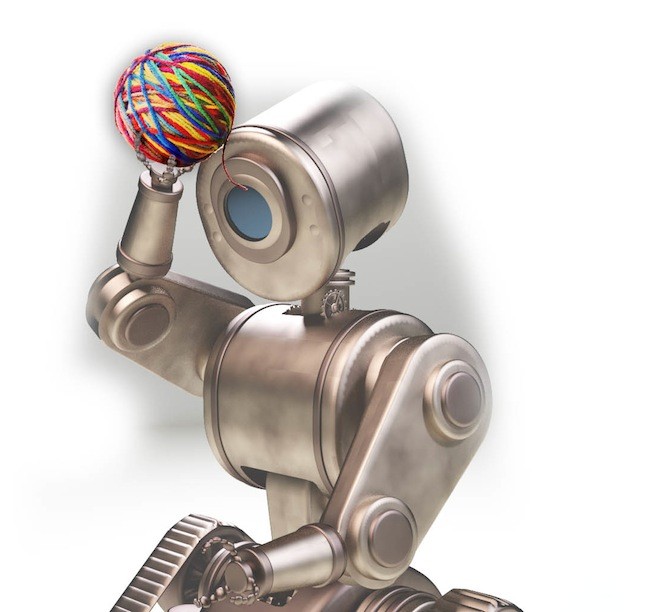
You won't want me on your team when the zombie apocalypse happens—if you want to survive, that is. I'll be nothing but a liability, unable to carry a heavy assault rifle far or swing an ax at a recently dead/undead neighbor. My plan, when I think about the zombie apocalypse at all, is to barricade myself in my apartment and ration food and water long enough to make a dent in my piles of yet-unread books. Eventually, I'll pass out from starvation, and my cats will eat me and become zombie cats, probably.
It actually doesn't sound too bad, but unfortunately, I don't believe that a zombie apocalypse is approaching. No, mankind will soldier on zombie-free, multiplying and replenishing the earth and inventing thinner but unbendable iPhones and robots that can make and deliver pizzas within seconds.
And that's exactly what I'm afraid of—not zombies, or a new virus strain that will wipe out the population within days. It's a slower, less-dramatic apocalypse that scares me: the inevitable, unstoppable drift toward joblessness, poverty and stagnancy as humans become unnecessary.
And it's already begun.
A Google search for "robot jobs" yielded 58.9 million results, all terrifying and many published in the past month. Reading the articles, I felt like someone in an early expositional scene in I, Robot, and wished I had a scientist in the room to explain with scribbly arrows and robot drawings on a giant whiteboard the complex, meta arguments for and against worker robots.
Many on the pro side point to the Industrial Revolution as proof that we have nothing to fear; things changed, but people still have jobs, and now we can buy cheap socks.
"If the machines really do take everyone's jobs, then by definition, the things made by those machines are going to be so cheap that they're essentially free," writes Tim Worstall, a fellow at the Adam Smith Institute in London, in an Oct. 5 piece for Forbes.com. He argues that the end result of robot jobs will be everyone's income being rendered infinite. "If the machines really are making everything, including the machines that make the machines, then the price of a machine that makes machines becomes near zero, and so therefore everyone owns one of those anyway," Worstall says. "Perhaps I'm missing something, but I just don't see what the problem is."
Historians centuries from now might indeed look back with favor upon the Robot Revolution. But though the reign of a monarch or a period of social change takes just a few lines to describe, millions of lives begin and end while these events come to pass. And I've seen enough talented, hardworking people lose jobs or be unable to find them to know that the transition to a world driven and created by robots isn't a painless one.
So even if the future is an infinitely happy place of infinite incomes and infinite leisure time made possible by infinite robots, I don't think it's a world I want to live in—seems crowded, for one thing—and it's one I hope not to hasten. With that in mind, this week I'll drink a beer at a local bar and tip my human server; produce an issue of a local newspaper created by and for local people; browse the shelves of a physical bookstore; eat at a local restaurant; and, once I get a few more inches on the green circle I'm knitting, ask a human at the local knitting shop to show me how to turn it into the world's lumpiest beanie.
I make these choices not wholly out of fear of robots, and not because of some liberal-media mandate. More than anything, buying things from the humans who live in my city enriches my life. After spending 18 years in Layton, Utah, chain-restaurant capital of the world, I state with confidence that local restaurants have better food, and after five years of doing this paper's annual Gift Guide, I know that local boutiques have better do-dads and gifts than Target.
That knowledge is thanks almost entirely to my job at City Weekly. Editing Ted Scheffler's food reviews introduced me to italicized ethnic dishes, and got me to stop in at diners and cafes I'd been driving past without a thought. Picture the scene in The Wizard of Oz where everything is suddenly in dazzling color: That's what happened to my life when I first tasted curry at age 25 after reading a wonderfully descriptive column about a local restaurant's version.
Those little curry restaurants, by the way, need for me and other curry aficionados to continue gorging on curry to stay in business and stave off a future of disgusting robot-made Thai food. This week and every week, the following pages offer scads of information about life-enriching events, eateries, bars, bands, artists and creators, and they—and we—need support to keep going. So, rip out a few ads and tuck them into your billfold, or bookmark some restaurant menus on your smartphone, and then go out and experience your community.
And while you're waiting for another round at the bar, read this week's cover story on Amazon, and maybe think twice about clicking to buy something you could pick up down the street from a human rather than from a company whose goal is to replace human workers with automated systems.
I like bookstores and browsing in them, and I also want to keep my job so that I can keep buying books. My decisions are a small part of the cycle that keeps the community moving in a positive way, but you can't get a waterfall without a drop of water. So I'll forego the Amazon discount and pay the sales tax to carry a new book out of a brick & mortar bookstore in the hopes that I'll be able to do the same 10 years from now.
It's either that or burning down the robot factories. And I really don't want to anger the robots.